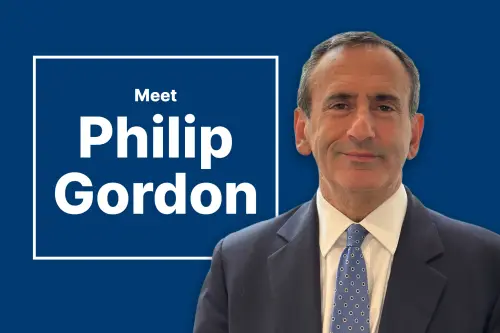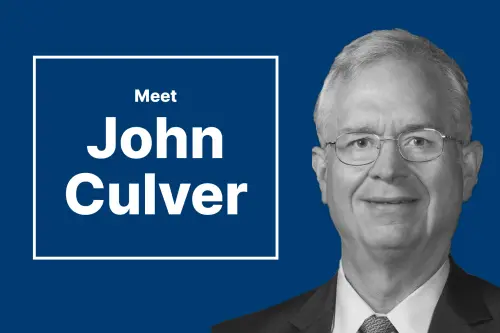Thomas Wright joined the Brookings Institution on February 18, 2025, as a senior fellow in the Strobe Talbott Center for Security, Strategy, and Technology after most recently serving as the special assistant to the president and senior director for strategic planning at the National Security Council in the Biden administration. He previously served as the director of studies at the Chicago Council on Global Affairs and a senior fellow and director of the Center for the United States and Europe at Brookings.
In the following interview, he discusses his experiences and the challenges facing the United States with Alejandra Rocha, a senior research assistant at the Talbott Center.
Alejandra Rocha:
Hi, Tom. Let’s start with a personal question. Would you tell me about your background and how it shaped your decision to pursue a career in foreign policy and international security?
Thomas Wright:
I grew up in Ireland and moved to the United States for graduate school in 2001, four weeks before 9/11. I always had a deep interest in international history and world politics. When I was pursuing my doctorate at Georgetown, I was fortunate to work closely with John Ikenberry, who is one of the leading scholars in the field of U.S. strategy and international order and used qualitative methods in his work. Through him, I also had the opportunity to engage and work with practitioners of U.S. foreign policy. After I finished my doctorate, I considered a career in academic international relations, but was more drawn to policy and think tanks.
Alejandra Rocha:
Turning to your time in the Biden administration, what were some of the key lessons you took away from your time as senior director for strategic planning at the National Security Council (NSC)?
Thomas Wright:
I can think of three lessons: First, pay attention to the linkages between different regions and issues. Those are often critically important but can fall through the cracks if the process is siloed. Second, even if you don’t think something will happen, if there is a 20% chance that it might, you should have a contingency plan. Third, think about your strategy for the medium term and long term, but always keep in mind what it means operationally for the short term. What do you need to do now to get to where you want to go?
Alejandra Rocha:
You worked on a wide range of issues at the NSC—from the Russia-Ukraine war and European security to U.S.-China relations, adversarial alignment, and the Global South. How did you and your team balance competing strategic priorities?
Thomas Wright:
We tended to prioritize the regional geopolitical issues that our leadership was grappling with the most. In practice, this meant that we spent about half our time on Russia-Ukraine and then a decent chunk of time on U.S.-China relations, major power competition globally, and geoeconomics. All of this involved cooperating closely with the other directorates working on these issues.
Alejandra Rocha:
You and your team at the NSC were responsible for drafting the 2022 U.S. National Security Strategy. What were the biggest challenges you faced in crafting it?
Thomas Wright:
National security strategies often fall into two traps: the Christmas ornament problem, whereby everyone insists on including their pet issue, and the tendency to sand down the edges so much that it doesn’t actually say anything. The way around this is to make sure the senior leadership takes ownership of the document, and you have a clear understanding of what it is that you want to say. We were fortunate that Jake Sullivan, the national security advisor, was very intensely engaged in the document and that we were broadly aligned from an early stage about what we wanted to say.
Alejandra Rocha:
How have your views on great power competition and the international order evolved since writing “All Measures Short of War” (2017) and “Aftershocks” (2021)?
Thomas Wright:
The central argument on strategic competition in an interdependent world holds up well, I think, but the thing I missed was the extent of the domestic dysfunction in the United States, particularly with the return of Trump to the presidency in 2025. I’m still coming to terms with what that means for the trajectory of strategic competition and the international order.
Alejandra Rocha:
What research areas do you plan to focus on now that you’re back at Brookings?
Thomas Wright:
I plan to focus on many specific issues, including Russia-Ukraine, strategic competition in an interdependent world, the impact of artificial intelligence on national security, and geoeconomics. But I think the overarching question I’m thinking about is how should we try to rebuild the international order after Trump’s second term. It almost certainly cannot just be a restoration, so what comes next?
Alejandra Rocha:
What do you think are the biggest blind spots in U.S. foreign policy today?
Thomas Wright:
For the Trump administration, the blind spot is obvious. The administration really has no idea how the global economy works and why trade is not zero-sum. That, of course, comes from the top down. More generally, I think we still have a lot to do to integrate economics into mainstream foreign policy thinking. We did a lot on it in the Biden administration. Sullivan, for example, laid a lot of that thinking out in two speeches at Brookings. But the foreign policy community writ large still conceives of its role primarily through the lens of military power, diplomacy, and sometimes development, rather than fully appreciating the effects of economic and technological interdependence.
Alejandra Rocha:
What advice would you give to those who are interested in starting a career in foreign policy and international security?
Thomas Wright:
Read history, especially biographies. Learn about international relations theory, but also know how to leave it behind and not be defined by it. Read The Financial Times or The Wall Street Journal every day in hard copy, cover to cover. Grapple with real-world problems. Recognize that there are no easy solutions. Write even if it’s just for yourself to start with. Focus more on networking with your peers and helping them network with each other rather than networking up. Remember that, regardless of party, we’re all trying to deal with the same set of international issues, and there are people acting in good faith on both sides. Be willing to change your mind as more facts come to light.
The Brookings Institution is committed to quality, independence, and impact.
We are supported by a diverse array of funders. In line with our values and policies, each Brookings publication represents the sole views of its author(s).









Commentary
Talking US national security with returning Senior Fellow Thomas Wright
May 8, 2025